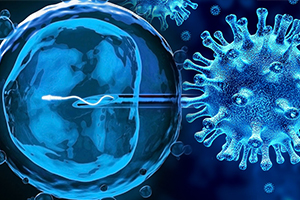- Their current health status
- Medical conditions like Respiratory or heart Diseases, diabetes, etc
- Recent travel history and if they were in contact with a Covid positive patient
- If they are medical professionals

COVID-19 – Is it safe to start IVF?
The outbreak of the corona virus (covid-19) has affected a majority of couples who had the dream of starting a family through IVF. While several patients are concerned that the delays in the treatment may have an effect of their chances of conceiving, the others are not sure if this is the right time to continue with their treatment. Scientists have shown that a time period of 180 days between the initial diagnosis and starting an assisted reproductive treatment cycle will not lead to a negative outcome (Romanski et al., 2020).
Patients who already underwent multiple cycles or who want to start a cycle as early as possible due to medical conditions have a negative effect on their psychological and emotional health. The IVF Access team understands this and follows treatment strategies with the guidance of the ICMR to provide our patients with the best medical care in the safest way.
All our patients are asked to promptly answer a risk management triage questionnaire which includes questions regarding

Leave a Reply